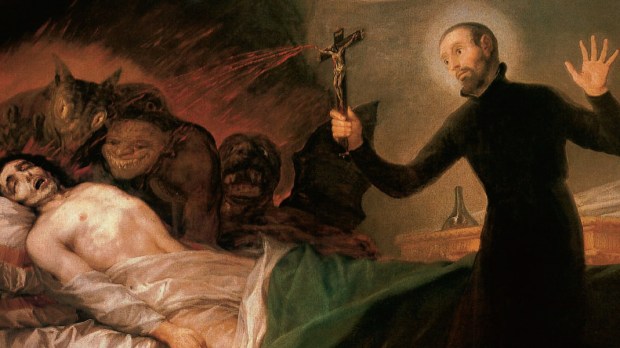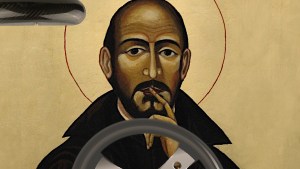On May 1, 1539, Queen Isabel of Spain, wife of Charles V, died in Toledo while giving birth to her fifth child. At that time, it was a kind of everyday drama that spared neither aristocracy nor bourgeois, neither peasants nor poor women. One woman in two, at the time and for a long time afterwards, died during or immediately after childbirth.
This cruel fact didn’t reduce the immense grief of those left behind in such cases. Infatuated with his beautiful Portuguese princess, Charles V shut himself away in a monastery to mourn her in peace. The funeral, in accordance with the custom of the Catholic monarchs, was to be held in the dynasty’s funeral chapel in Granada. In his grief, the king entrusted its organization to one of his most loyal servants, the Marquis de Lombay, and his wife, Leonor de Castro, her lady-in-waiting, who had come with her from Portugal.
Corrupt ancestry
Who was the Marquis de Lombay? The first-born son of the Duke of Gandia and Joan of Aragon, de Lombay’s mother was the illegitimate daughter of the Archbishop of Zaragoza, who was himself the illegitimate son of King Ferdinand of Aragon. His paternal grandfather was Juan de Gandia, also born out of wedlock, in this case to one of the mistresses of Cardinal Rodrigo Borgia, future Pope Alexander VI and nephew of the late Pope Calixtus III…
If the situation seems quite shocking to us, it was in fact far less so in the eyes of his contemporaries, who considered the government of the Church to be as political as that of any secular state. Cardinals and sovereign pontiffs were administrators and warriors, not saints, and few of them had embraced the religious life out of vocation. People turned a blind eye to the morals and private lives of these men, even if they were not very edifying, or even shocking.
That said, Pope Alexander VI, despite his affairs and adulterous children — whom he shamelessly flaunted and married off royally — was a man of faith who feared God from time to time, and didn’t play around with Catholic teaching.
This bizarre ancestry was in no way detrimental to the Marquis de Lombay. In any case, it was totally beyond his control. Besides, there were exemplary Christians in the family. For example, his grandmother joined the Poor Clares after the tragic death of her husband Juan, the first Duke of Gandia (the Pope’s eldest son, presumably slain on the orders of his younger brother, Cardinal Cesar Borgia).
A mission that changed his life
This example, like that of his parents, made Francis Borgia de Gandia, Marquis de Lombay, a remarkably pious boy. Had he not been the eldest, he would have chosen to enter Holy Orders, a choice vehemently opposed by his father.
Francis’s marriage for love and his brilliant success at Court seemed to have put this whim aside. He didn’t know it yet, but the funeral mission his king had entrusted him with would turn his life upside down. It’s a 310-mile journey from Toledo to Granada, which took more than a month at the pace of the funeral cart. Spain is very hot in the month of May. Despite the lead coffin in which it had been placed, the queen’s body was decomposing.
Etiquette dictated that, on arrival at the royal necropolis, the coffin had to be opened to ensure that the body was indeed the one entrusted to the care of the escort. The lid was removed and the witnesses were invited to attest to the identity of the deceased. However, Isabel’s body was in such a state of decay that no one dared approach to identify her, or to attest that she was indeed the radiant, ravishingly beautiful young woman they had once known.
No one except Francis Borgia, a slave to his sense of duty. The shock was excruciating. Confronted with the reality of death, he testified that this “thing that has no name in any language” was indeed the Queen of Spain — a fact he could swear to, for he hadn’t taken his eyes off the coffin for a moment. Then, quite pale, the Marquis de Lombay murmured: “I will never again serve a lord who can die.”
He would respect that oath as soon as he was given the chance.
A prayer of offering and abandonment
Having become Duke of Gandia on the death of his father in 1542, Borgia lost his wife four years later. As she was dying, the duke, who was still in love with her, begged Heaven to let her stay with him. The crucified Lord, before whom he prayed, replied: “If you deeply desire that I should leave you your duchess any longer, I leave it to you alone to judge, but I warn you that this choice would not be suitable.” Broken but resigned, Francis responded with a prayer of offering and abandonment:
Lord, I can do nothing less to respond to Your infinite and gracious generosity than to offer You my life, that of my wife, that of my children, and everything I possess in this world. It is from Your hand that I have received everything, so I return it all to You, asking You to dispose of it according to Your good pleasure.
Two years later, Frances Borgia joined the Society of Jesus, eventually becoming its General and one of its greatest figures.



